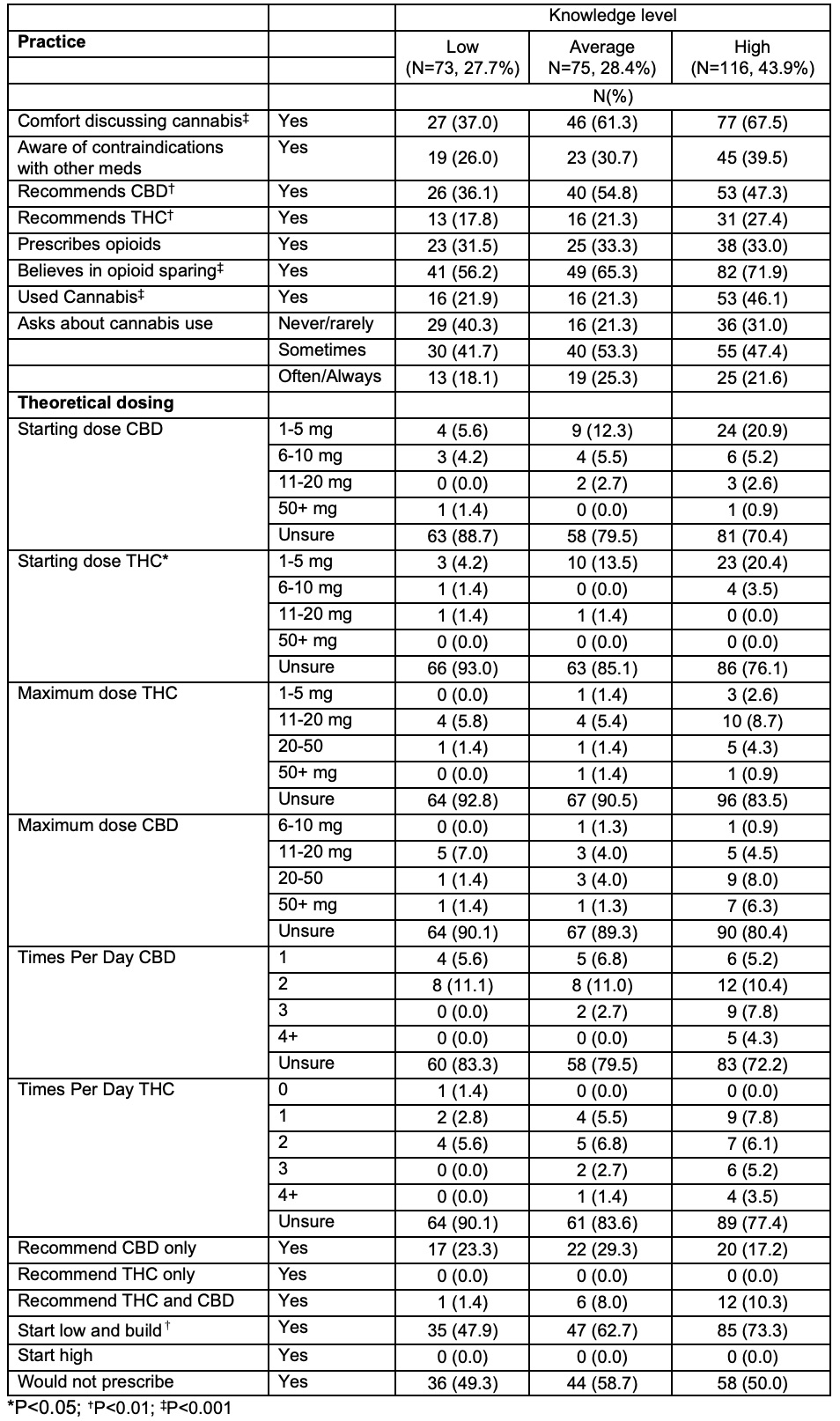Session Information
Session Type: Poster Session B
Session Time: 10:30AM-12:30PM
Background/Purpose: As medical cannabis becomes increasingly integrated into clinical care, healthcare providers—particularly those managing chronic rheumatologic conditions—must navigate wide-ranging levels of knowledge, attitudes, and prescribing comfort. This international study examined how rheumatology providers’ cannabis-related knowledge and attitudes influence clinical practices, including theoretical prescribing behaviors, dosing decisions, and patient communication.
Methods: Between November 14, 2023, and February 3, 2025, 281 international rheumatologists and rheumatology-affiliated clinicians completed a cross-sectional survey. A six-item cannabis knowledge score (range 0–6) was standardized and trichotomized into low (n = 36, 15.9%), average (n = 156, 69.0%), and high (n = 72, 31.9%) knowledge-level groups. Two-step cluster analysis of 11 cannabis attitudinal items yielded three profiles:Progressive (n = 90, 39.8%)—supportive of cannabis and policy reform;Unsure (n = 91, 40.3%)—cautious, ambivalent, and often uncertain; andTraditional (n = 84, 37.2%)—more skeptical, concerned about harms, and less supportive of legalization. Eight clinical practice outcomes and 10 theoretical dosing practices were analyzed using chi-square.
Results: Respondents were primarily female (61.2%) and white (78.9%), with most practicing in urban (87%) and academic (68.4%) settings in the United States (47%). Compared to lower cannabis knowledge, higher knowledge levels were significantly associated with greater comfort discussing cannabis (67.5% vs. 37.0%, p < .001), awareness of contraindications with other medications (39.5% vs. 26.0%, p < .05), believe it is opioid sparing (71.9% vs. 56.2%, p< 0.001) and recommending CBD (47.3% vs. 36.1%, p < 0.05) and THC (27.4% vs. 17.8%, P< 0.05). A preference for 'start low and build' dosing was more common among those with high knowledge (73.3%) compared to low knowledge (47.9%, p < .01). Among attitudinal clusters, Progressive providers were more likely to recommend CBD (58.6%) and THC (33.0%) compared to Traditional providers (34.1% and 14.5%, respectively, p < .05). Progressive providers also reported higher opioid-sparing beliefs (83.3% vs. 48.8%, p < .001). Uncertainty regarding dosing was common across all clusters and knowledge groups, particularly regarding THC and CBD starting and maximum doses.
Conclusion: Among rheumatology providers, both cannabis-related knowledge and attitudes significantly influence clinical perspectives and theoretical prescribing decisions. Educational efforts should address not only knowledge gaps but also attitudinal ambivalence to support informed, patient-centered cannabis care.
 Table 1: Knowledge level by practice outcomes and theoretical dosing in rheumatology providers.
Table 1: Knowledge level by practice outcomes and theoretical dosing in rheumatology providers.
.jpg) Table 2: Attitudes clusters level by practice outcomes and theoretical dosing in rheumatology providers
Table 2: Attitudes clusters level by practice outcomes and theoretical dosing in rheumatology providers
To cite this abstract in AMA style:
Zeiger J, Katz P, Fitzcharles M, Kassan S, Simon T, Michaud K. Cannabis Knowledge, Attitudes, and Practices Among Rheumatology Providers: Implications for Clinical Care and Education [abstract]. Arthritis Rheumatol. 2025; 77 (suppl 9). https://acrabstracts.org/abstract/cannabis-knowledge-attitudes-and-practices-among-rheumatology-providers-implications-for-clinical-care-and-education/. Accessed .« Back to ACR Convergence 2025
ACR Meeting Abstracts - https://acrabstracts.org/abstract/cannabis-knowledge-attitudes-and-practices-among-rheumatology-providers-implications-for-clinical-care-and-education/
